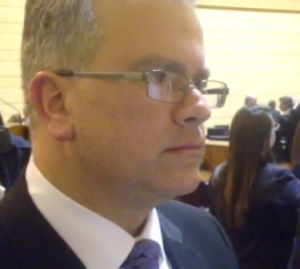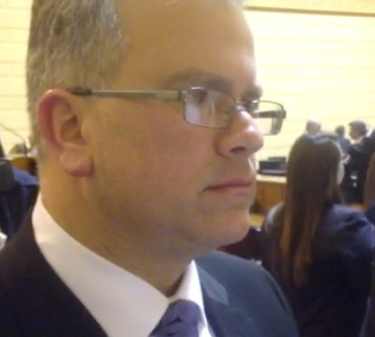 House Speaker Nick Mattiello is in New York today meeting with representatives of Standard and Poor’s and Moody’s, the two biggest of the credit ratings agencies. (No word on how Fitch feels about the snub.) It’s not perfectly clear what he thinks he’s going to get from this trip. Perhaps he’s going to look into the Moody’s representatives eyes and “get a sense of his soul” the way George W. Bush did with Vladimir Putin? That went well, didn’t it?
House Speaker Nick Mattiello is in New York today meeting with representatives of Standard and Poor’s and Moody’s, the two biggest of the credit ratings agencies. (No word on how Fitch feels about the snub.) It’s not perfectly clear what he thinks he’s going to get from this trip. Perhaps he’s going to look into the Moody’s representatives eyes and “get a sense of his soul” the way George W. Bush did with Vladimir Putin? That went well, didn’t it?
So what will Mattiello find when he meets with these guys? I predict he will find earnest, intelligent, kind, and solicitous people. They will make sympathetic noises about the awkward plight of our poor state and the unwise choices made by our previous governor and speaker of the House. They will understand immediately the ramifications of our difficult position. But they will point out all the worst-case scenarios, because they are also people who believe very strongly that the end of western civilization will be nigh if a state is allowed to renege on a commitment they imagine it to have made. Where, I ask you, will their commissions come from if the bond market changes even a tiny bit? They will see their job in these meetings as making Mattiello’s hair stand up even straighter than it usually does, and will probably succeed.
There are times when personal contact is misleading. After all, the earnest, intelligent, kind, and solicitous people he will meet represent agencies that are deeply corrupt, in the pay of the banks whose bonds they rate, constantly trying to curry favor with the very institutions they are supposedly there to police, while abusing the powerless. There have been virtually no changes to their business model since that very business model led our financial markets to the verge of collapse in 2008.
If Mattiello was in search of actual answers to actual questions, he would do far better to spend time interviewing the bond buyers for the insurance companies who hold most of our state’s bonds. Those are the people whose opinion will actually be important, because those are the people who actually give us the money we need to borrow. I’m more interested to know whether they are capable of reading a bond prospectus and understand the difference between a general obligation bond approved by the voters and a bond that says all over it that it is not such a thing.
There is a class of questions out there that cannot be answered by asking them. I learned years ago, for example, that I cannot learn whether today is opposite day by asking my daughter. If it is opposite day, she will say no when I ask, and if it is not, she will also say no. I have to think of another way to answer the question. There’s a lovely discussion of exactly this point in Snow et al’s 1991 book, “Unfulfilled Expectations: Home and School Influences on Literacy“, where the authors speculate about the futility of having well-dressed Harvard education researchers with clipboards ask poor mothers how many times a week they read to their children.
Here are some other questions whose answers cannot be found by asking:
“Hey Mr. Rich Person, will you leave the state if we raise your taxes?”
“Hey Mr. Business Owner, will you bring jobs back to this state if we lower your taxes?”
“Hey Mr. Bond Rater, will you leave our state bond rating alone if we let an independent agency default on its bonds?”
Incalculable damage has been done to our state by people who imagine that the way to answer questions such as these is simply to ask them directly and take the answers at face value. (Typically by people who will then call me naive.)
The public nature of Speaker Mattiello’s trip, and the people he intends to visit and to hear imply that what is going on here is not actually a fact-finding trip, but Kabuki theatre, the beginnings of political cover for making the unpopular decision to give in to the threats and repay the bonds. If true, this is unfortunate. Perhaps we can only hope that somehow weak knees will ward off the tax-cut fever that I hear is infecting the back rooms of the House this past month.





